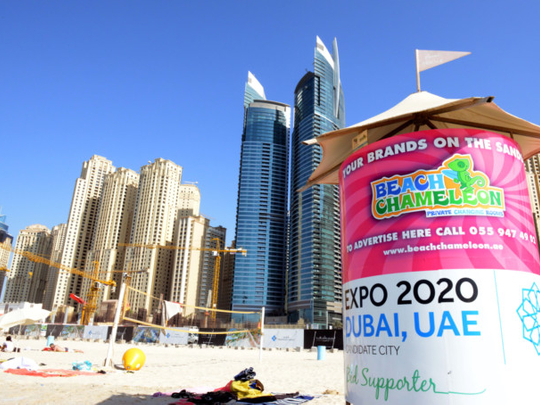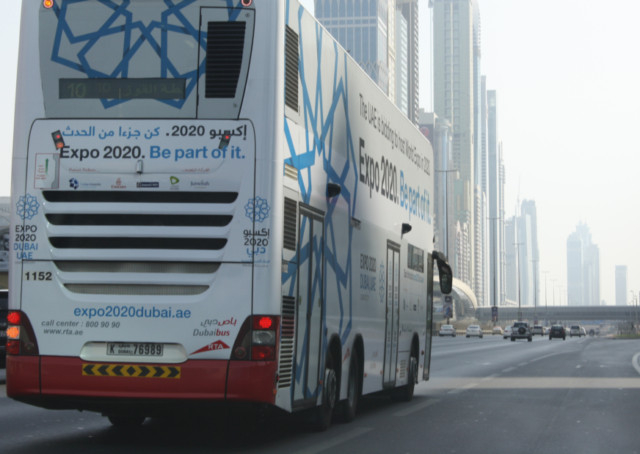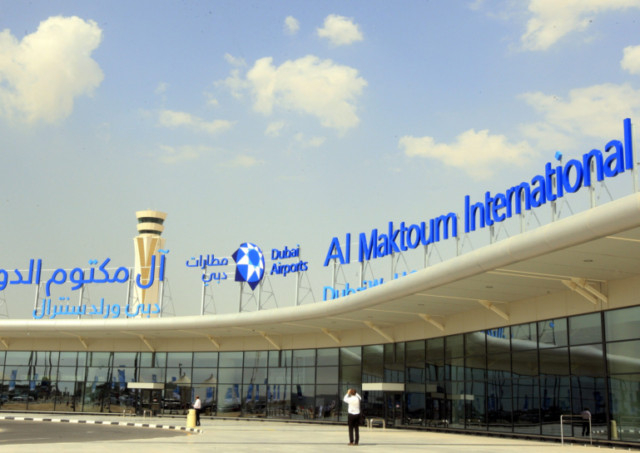
The world’s eyes are on Paris today as the 167 member nations of the Bureau of International Expositions (BIE) vote to determine the host city of the World Expo 2020. Dubai stands as the frontrunner in the race against three other cities — Ekaterinburg (Russia), Izmir (Turkey) and Sao Paulo (Brazil). The emirate has also been endorsed by Canada, France and the UK, further strengthening its position.
Several factors contribute to Dubai becoming a strong contender. The futuristic vision of His Highness Shaikh Mohammad Bin Rashid Al Maktoum, UAE Vice-President and Prime Minister and Ruler of Dubai, has been a key driving force in the bid.
So are the emirate’s ambitious development initiatives, world-class infrastructure, sustainable economic growth, and its increasing popularity as a global trade and tourist destination and a multicultural society of more than 200 nationalities.
A successful bid will be a defining moment not just for Dubai, but for the UAE and the rest of the Middle East and North Africa (Mena), as it will create new employment, investment and commercial opportunities. The real estate sector is one of the areas that would greatly benefit, according to experts. Property Weekly investigates the impact of a successful bid on the property market.
“This is a prestigious world event that will put Dubai on the world map, more than what it already is,” says Robin Teh, Country Manager — UAE, Chesterton Mena. “This means that Dubai will be able to bid for more world events in the future. Investors will become more confident in Dubai, especially blue-chip funds and sovereign wealth funds.”
David Macadam, CEO of the Middle East Council of Shopping Centres, says the World Expo will bring a sense of pride among residents of the city. He adds, “Dubai has always been ready to welcome the world and this will be a formal opportunity to invite the world to the Dubai Expo 2020 global fair.”
The real estate sector has already witnessed a positive surge in anticipation of Dubai winning the Expo bid, says Khalid Bin Kalban, Managing Director and CEO of Dubai Investments.
“If the bid is successful, we expect an acceleration in some iconic projects as there will be a spurt in the overall demand from investors. The World Expo in Dubai will create more than 250,000 jobs and is estimated to attract more than four million visitors every month during the event.”
Influx of fresh money
The event will have a capital expenditure of approximately Dh65 billion from both the government and the private sectors, says Kalban.
“I am sure the overall optimism will translate into local and international investors eyeing long-term investments and growth in Dubai’s real estate sector. We foresee the expectations of investors and businesses to increase dramatically across the entire spectrum of real estate, from commercial to residential,” says Kalban.
Teh says more money will be poured into Dubai from investors and speculators alike who want a piece of the pie.
“I believe all sectors will enjoy this increase, starting from construction, tourism and hospitality, while the rest will follow,” he says. “Investments for 2020 will come thick and fast initially, and will slow down after a couple of years as construction starts, while more tourism projects will be announced as 2020 gets closer.”
Impact on markets
However, it is important to look at how major events drive markets, says Michael Lunjevich, Partner, Hadef Partners.
“Almost certainly, they will create cash injections for infrastructure and facilities. However, sometimes they create white elephants that are not used after the event,” says Lunjevich. “The trick is to create sustainable investments that give back to the community after the event and not those that simply create a PR-driven, short-term property boom.
“Dubai’s bid has something different. The location of the proposed Expo centre and the proximity to Jebel Ali Port and Dubai World Central mean it has the capacity to drive long-term infrastructure that really creates a new evolution in Dubai.”
Macadam notes numerous legacy projects were built in past World Expos, starting in 1889 in Paris with the creation of the Eiffel Tower, which remains an iconic structure and a historic symbol of the world’s fair.
“At Expo 1986 in Vancouver, Canada, there were a number of great legacy projects and buildings that came as result of the Expo, including the Sky Train, which is a modern metro similar to the Dubai Metro, Canada Place, which is a huge waterfront conference centre and cruise ship terminal, and Plaza of Nations, which comprises waterfront offices, night clubs and restaurant venues,” says Macadam.
“The World Expo is also a time when the host country builds up the infrastructure and buildings from raw land, which is transformed into a showcase of the values and the energy of the host country. That is what we will see in Dubai, in the area around the new airport. Sophisticated and leading-edge development projects will be the legacy of the country,” says Macadam.
Urban planning
Filippo Sona, Director and Head of Hotels (Mena) at Colliers International, says the large-scale event will bring a higher level of sophistication to Dubai real estate. Urban planning will need to be enhanced not only because of the Expo, but also as a result of other major projects such as the Al Maktoum International Airport and Meraas theme park development in Jebel Ali.
“Dubai will witness the development of a new commercial cluster in these venues. However, the big challenge will be the period after the Expo, as by then Dubai’s population would have increased significantly,” says Sona. “This requires considerable thought on the development of the Expo master plan and adjacent areas.
“Ideally, the adjacent areas should comprise small, integrated mixed-used communities to accommodate the increase of population and also spread the population across Dubai.”
Metro expansion
Sarit Thomas, Associate at Taylor Wessing, says there will be significant investment in Dubai’s infrastructure projects.
“This includes the Dh5-billion expansion of the Dubai Metro, which would be expedited according to Dubai’s Roads and Transport Authority,” she says. “The implementation of recently announced real estate projects will more likely be accelerated and we will see more projects being announced in and around Dubai World Central, causing the city’s real estate landscape to expand towards the Expo site.”
Housing requirements
With increased economic activity comes more employment opportunities, which will lead to an increase in population and in housing demand, says John Stevens, Managing Director, Asteco Property Management.
“The UAE population is expected to hit the 10-million mark by 2020, and so the industry will obviously grow organically and be considerably larger than it is today,” says Stevens.
“Notwithstanding macroeconomic and political issues, and extraordinary supply-demand dynamics, property sales and rental prices should continue to rise, but at more moderate [single-digit] levels than we have seen over the past 18 months.”
Steve Morgan, Head of Cluttons Middle East, says even without the World Expo, the population is already growing at a fast pace. It is therefore reasonable to assume that there will be a continued rise in demand for housing units, which may push prices over time.
“This depends on what comes onto the market during the next three to five years,” says Morgan. “Given that approximately one-third of new jobs will be in the hospitality sector, there will be a major need for affordable housing.”
Residential schemes will increasingly use green-building technologies to reduce Dubai’s carbon footprint, as decreed by the government, say Morgan.
“Furthermore, there is already a shift away from the super high-end market, with more mid-range and affordable homes taking centre stage,” he says. “This, coupled with the steps taken to prevent an overheating market, is likely to translate into a slower pace of growth. We are already starting to see the first signs of this with a drop in the number of deals we are recording.”
Supply and demand
Lunjevich predicts short- to mid-term increases in property rents and prices, while the supply ramps up to catch demand.
“The key factor will be how to manage the supply side,” he says. “The fact we have off-plan sales with 5 or 10 per cent down payment means that demand can ramp up very quickly with speculators. It is important to ensure enough supply is there to meet [end-user and speculative] demand so as to ensure there are no unwelcome spikes in prices.
“Also, how the supply comes online needs to be managed to ensure there is no huge dip in prices when the supply side catches up. The mid- to long-term effect depends on how the supply-demand dynamics is managed.”
However, a winning bid is unlikely to translate into a flurry of uncontrolled building activities.
“The market is a lot more mature now than it was during the boom in 2007, and the authorities are likely to monitor activity and implement appropriate measures to prevent a repeat of the 2009 real estate crisis,” explains Morgan.
Property prices and rents
Khawar Khan, Research Manager, Knight Frank, says prices of prime residential properties are expected to recover faster, and they could start hitting their previous peak by mid-to-late next year.
“The investors will continue to see healthy returns on the back of rising capital values, whereas end users may find that rising prices, combined with higher loan-to-value restrictions and transfer fees, leave them unable to purchase property that they would have been able to buy just six to 12 months ago,” adds Khan.
Richard Bradstock, Senior Consultant with IP Global, a property investment company, says there is widespread confidence that property prices will rise on the back of a successful Expo bid.
“Due to this belief, it is almost certain that prices and the level of development will increase exponentially, as all investment asset classes are ultimately fuelled by confidence in the said asset class,” says Bradstock. “The major worry for us is not whether it will happen or not, but whether it’s happening for the right reasons.
“Property price rises based on single, one-off events are rarely sustainable and it concerns us, given the market’s recent jumps over the past 18 months, coupled with the fact that prices are likely to rise even further should Dubai win.”
Bradstock points out assets that go up in value extremely quickly generally lead to very short investment cycles, and that it is not ideal in the real estate market because property is not a liquid asset.
“Should Dubai not win the Expo, there is a chance the local market might experience a temporary blip,” says Bradstock. “However, the fundamentals in Dubai remain strong when compared to other Middle Eastern investment destinations, so there would still be a good, long-term growth and possibly at more sustainable levels.”
Law and regulations
Dubai has also seen changes in its laws that have affected the real estate sector.
“The Dubai Land Department has recently increased transfer fees of properties from 2 per cent to 4 per cent, in an attempt to limit speculation in the real estate market, while the UAE Central Bank has set strict borrowing limits,” says Thomas.
“As a large percentage of transactions in Dubai are not financed, it is thought that the new borrowing limits will not greatly reduce speculation in the market, but may have more effect on end users, as they will have to try to find the difference between the purchase price and the loaned amount.”
Stevens says rent reforms in Dubai will also impact the real estate sector as the Dubai Land Department is set to enforce a new standard rent contract late next year.
“Early next year, three major pieces of legislation will come into effect, covering the relationship between the landlord and tenant, regulation of the relationships in the real estate sector and a mechanism for rent disputes,” says Stevens.
“These moves will encourage the sustainable development of the real estate sector in Dubai, and also increase the transparency quotient to create a clear path for owners and tenants moving forward.”
Winning the right to host the World Expo 2020 will result in more real estate projects to be undertaken in Dubai, which will in turn lead to an increase in demand for office space, says Stevens.
“The commercial sector currently has a large amount of inventory, with further stock expected in the near future,” says Stevens. “Asteco expects another 1.1 million sq m to hit the market by the end of next year, in addition to the 9.6 million sq m currently available [as per data from the first half of the year].
“We believe that the commercial sector will see an improvement in the take-up rate and the number of transactions before it witnesses any price escalation. Furthermore, the location of Expo-related projects will determine which zones — and consequently commercial stock — will experience greater demand and growth.”
Retail and hospitality
In the retail sector, Macadam anticipates more investment opportunities in the years leading to the Expo.
“Global retail provides 10 per cent of the world’s GDP. Retail is a massive industry globally,” says Macadam. “If I go back to my experience in Vancouver, shopping centres and high-street retail were built especially for Expo 86 and I see the same thing happening here.”
Christopher Hewett, Senior Consultant at TRI Hospitality Consulting, anticipates strong investment in the hospitality industry, especially in the areas immediately around the Expo Pavilion and the wider Jebel Ali area.
“This will be through a wide range of projects, including mixed-use developments with hotel, residential and leisure components and stand-alone hotel and serviced apartment projects,” says Hewett. “With current occupancy levels at around 80 per cent, the market will need additional properties in order to accommodate the scores of international visitors expected during the six-month event.”
Hewett notes the government could even implement a cap on hotel and hotel apartment rates, which could rise sharply because of the influx of visitors.
“During the Expo 2020, the market is likely to witness occupancy levels close to 100 per cent for the entirety of the six-month event,” says Hewett.
Sona adds, “The current supply of hotels and hotel serviced apartments is likely to increase to 110,994 keys by the end of 2017, which constitutes an increase of 24,838 keys. There are speculations this may even reach 115,449. The hospitality market will continue to maintain high occupancy and average room rates for the years before the Expo.
“In view of new hotels being built as a result of Dubai winning the Expo, this will also put pressure on existing hotels to start planning for refurbishment to maintain their competitiveness.”
The hospitality industry will benefit more during the years leading to the event, than the actual year of the event. “This has been the trend in any major market where a large-scale event such as the Olympics or World Cup took place,” says Sona.
Whether Dubai is successful or not, Hewett anticipates the hotel and tourism markets to continue to grow and strengthen.
“Dubai’s economy is been built on key pillars, of which tourism is one,” says Hewett. “Government-backed entities will therefore continue to strive to attract an ever-increasing number of visitors to the city.”
If Dubai wins
Most experts agree that hosting the World Expo 2020 will have a positive, long-term impact on Dubai’s economy, particularly in construction and real estate.
“There will be more real estate projects as investor demand grows and the need for housing increases as a result of population growth, which is also due to a boost in the job market,” says Thomas.
“Past Expo events have had a negative impact on residents with traffic jams, overcrowding and an increase in pollution. Dubai will have to study carefully previous events to ensure that Expo 2020 is managed properly and successfully.”
Experts predict Dubai’s property sector will continue to witness steady and sustained growth even in the unlikely event that Dubai’s bid is not successful.
“Dubai has the region’s premier transportation infrastructure and has a vision to carry it forward into the 21st century and achieve sustainable economic growth,” says Morgan. “The Expo would be a spectacular confidence boost to Dubai as it emerges and reinvents itself following the recession.
“However, even without the Expo, Dubai is expected to press on with its ambition of creating a world-class city, arguably one of the most remarkable ever seen.”
Macadam adds, “Winning the World Expo 2020 will mean we can all work towards the target date in October 2020. Everything will be open and ready to welcome 25-28 million visitors from around the world. The Expo will also coincide with the 50th anniversary of the UAE. So, even before the Expo 2020 bid, our leadership has already announced Vision 2020, which aims to welcome 20 million tourists in Dubai by 2020.
“To achieve this goal, we must make our lifestyle in Dubai even more attractive.”




